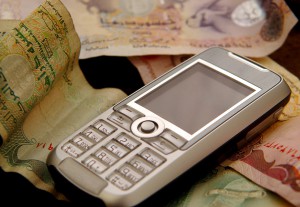 The Federal Trade Commission (FTC) recently released a staff report focusing on a topic that has been in the spotlight for the better part of a decade: mobile payments, (i.e. the payment for goods/services executed through the operation of a mobile device). The FTC conducted a survey of 1,000 of the most successful executives in the fields of financial services, technology, telecommunications and retail marketing and found that 83% believed that “mobile payments would achieve widespread mainstream consumer” adoption by 2015. The benefits to mobile payments are clear: they are an easy and convenient way to pay for products, allowing consumers to take advantage of mobile coupons and providing under-served communities and consumer sectors with greater access to alternative payment systems. Moreover, there is evidence to suggest that merchants will receive payments faster and lower their transaction costs by allowing consumers to utilize funding options besides credit or debit cards. Despite the inherent benefits, the FTC also found that a majority of consumers did not feel confident transmitting financial data over their mobile devices. In response, the FTC identified three areas of concern regarding mobile payments and how to best overcome those concerns.
The Federal Trade Commission (FTC) recently released a staff report focusing on a topic that has been in the spotlight for the better part of a decade: mobile payments, (i.e. the payment for goods/services executed through the operation of a mobile device). The FTC conducted a survey of 1,000 of the most successful executives in the fields of financial services, technology, telecommunications and retail marketing and found that 83% believed that “mobile payments would achieve widespread mainstream consumer” adoption by 2015. The benefits to mobile payments are clear: they are an easy and convenient way to pay for products, allowing consumers to take advantage of mobile coupons and providing under-served communities and consumer sectors with greater access to alternative payment systems. Moreover, there is evidence to suggest that merchants will receive payments faster and lower their transaction costs by allowing consumers to utilize funding options besides credit or debit cards. Despite the inherent benefits, the FTC also found that a majority of consumers did not feel confident transmitting financial data over their mobile devices. In response, the FTC identified three areas of concern regarding mobile payments and how to best overcome those concerns.
Mobile Payment Dispute Resolution
First, the report states that mobile payment disputes are already becoming an issue and consumers are unclear what, if any, protections are available to address fraudulent charges originating through mobile payment devices. Much of the confusion stems from the fact that under current regulations, consumers are granted different protections depending on the method of mobile payment used, whether it be credit and prepaid debit cards or even charging the payment to their mobile billing statement. For instance, a consumer’s liability is capped at $50 for unauthorized use of a credit card, but for debit cards, the liability cap is increased to $500 if not reported within 2 days. For other forms of mobile payment, the consumer could face unlimited liability. To clear up any confusion relating to mobile payment dispute resolution, the FTC report urges companies to develop clear and conspicuous dispute resolution policies. In a somewhat related vein, for those consumers who already regularly pay for products/services via the mobile billing-platform statement, the FTC report notes that a practice has evolved in which certain unscrupulous merchants are including unauthorized charges inconspicuously on a consumer’s monthly mobile billing statement. The FTC has scheduled a discussion to address this practice, referred to as “mobile cramming.”
Mobile Payment Data Security
Second, the FTC also addressed data security issues involved with the transmission of mobile payments. The FTC found that 42% of consumers refused to use mobile payment mechanisms due to a concern that hackers would gain remote access to their phone or intercept payment information and/or other personal data. The FTC noted that while security features are available to protect consumers’ data, it is unclear whether all companies are employing them. As a result, the FTC report encourages industry-wide adoption of strong measures to ensure security throughout the mobile payment process and details several security measures that could be utilized, including end-to-end encryption, secure storage of information on mobile devices and dynamic data authentication.
Mobile Payment and Privacy
Third, the FTC addressed the privacy issues associated with mobile payments, particularly focusing on the large number of entities involved in each transaction and the extraordinary amount of data being collected by these entities. The FTC noted that, unlike traditional credit card transactions where the merchant only receives access to the financial information of the consumer, mobile payments provide the merchant with the financial, personal and locational data of the consumer. To better protect consumers, the FTC recommends that companies adopt a practice they call “privacy by design,” which mandates that merchants consider and address privacy concerns at every stage of the mobile payment transaction process and provide consumers with more transparency related to the mobile payment process. Doing so, the report notes, will increase consumer trust in mobile payment mechanisms and ensure that the benefits outlined at the beginning of this post will come to fruition sooner, rather than later.
If you are interested in learning more about this topic or need to review your mobile payment practices, please email us at info@kleinmoynihan.com or call us at 212.246.0900.
Attorney Advertising



